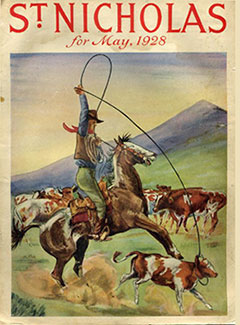This was first published in January of 2013. It has been read so often that it’s #6 on the countdown of Most Read Blog Posts. Serialization is a popular form all its own.
 Once Dickens made serialization popular, and profitable, it became a 19th Century publishing norm. There was the work of Dickens of course, but think of Uncle Tom’s Cabin, War and Peace, Sherlock Holmes, and many, many more. They were issued in serialized form. Recall that most important 19th (and 20th) century magazine for young people, St. Nicholas, which ran serialized novels. Growing up, I read the serialized novels of Thornton W. Burgess in the daily pages of the New York Herald Tribune. All followed the credo of Wilkie Collins, who, when speaking of the methodology of serialization, said, “Make them cry, make them laugh, make ‘em wait.”
Once Dickens made serialization popular, and profitable, it became a 19th Century publishing norm. There was the work of Dickens of course, but think of Uncle Tom’s Cabin, War and Peace, Sherlock Holmes, and many, many more. They were issued in serialized form. Recall that most important 19th (and 20th) century magazine for young people, St. Nicholas, which ran serialized novels. Growing up, I read the serialized novels of Thornton W. Burgess in the daily pages of the New York Herald Tribune. All followed the credo of Wilkie Collins, who, when speaking of the methodology of serialization, said, “Make them cry, make them laugh, make ‘em wait.”
The longest book I’ve written, Beyond the Western Sea, was my attempt to write a Victorian-like saga. At 675 pages there was nothing of that length in the children’s book world in the pre Harry Potter era, 1995. Indeed I decided to write the book in short chapters, with each chapter having a cliff-hanging ending, so as to propel my readers to read just one more, as if had been written for serialization. [In fact, the publisher was so nervous about the book’s length that they issued it in two volumes, which proved to be a mistake.] When the book was done it came to my mind that I might try to do actual serialization in newspapers. That was the birth of Breakfast Serials.

Why did serialization become so popular? In the 19th Century, literacy was spreading among masses of people. Buying serial installments was a lot cheaper than buying a book. More than that, a serialized story means, beyond all else, a shared story. Social reading. Think of the book club experience, but multiply it by thousands! Think what a relief it is (say in a classroom) not to have the fast reader spoil the book for the slow reader by announcing what happens next. They can’t, because no one knows. Readers are always on the same page.
To be continued …